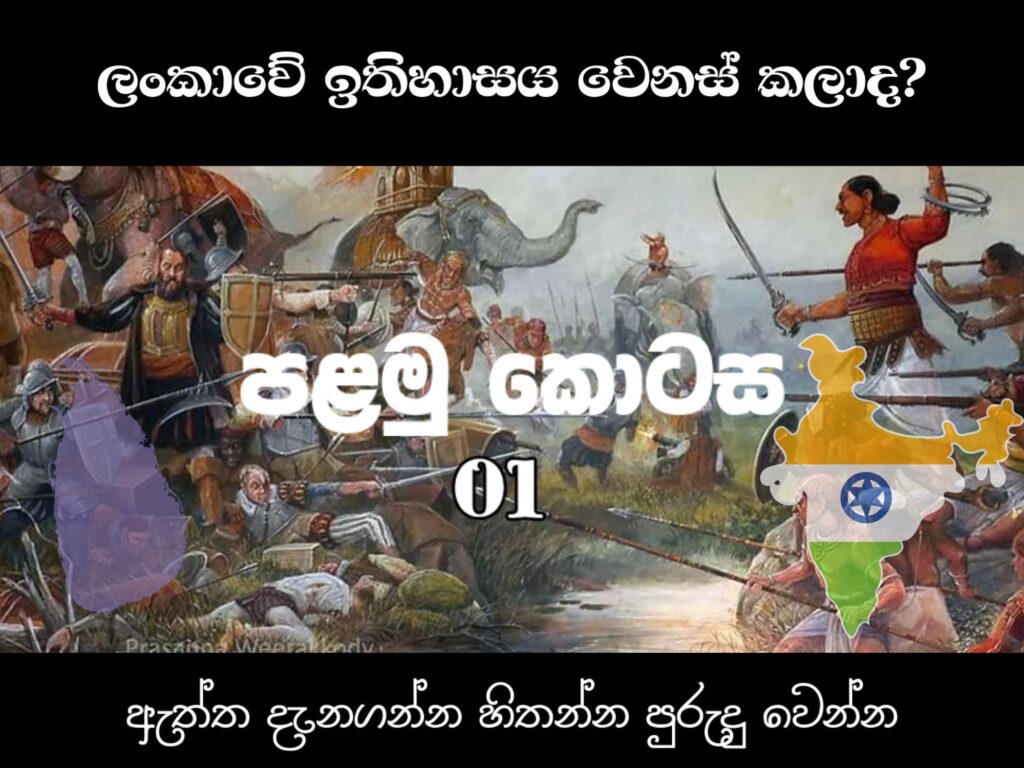
Did Someone Change Sri Lanka’s History? What Is the True History of Sri Lanka in Relation to Buddhism and India?
The Importance of Understanding History
We’ve all heard the saying: “A nation that does not remember its history is bound to repeat its mistakes.” This is especially relevant when discussing Sri Lanka’s history. For centuries, our past has been written, rewritten, and sometimes even altered to fit different narratives. Many believe that historical records have been adjusted to serve political and social agendas.
Understanding history is crucial because it helps us build a better future. If we misinterpret our past, we may make poor decisions that affect our nation’s progress. That’s why it is important to separate fact from fiction.
The Early History of Sri Lanka
Sri Lanka’s history is often linked to the arrival of Prince Vijaya, who is believed to be the ancestor of the Sinhala people. This story, along with many others, comes from ancient texts such as the Mahavamsa and Dipavamsa.
However, historians debate whether these records are entirely factual or if they were written to glorify certain rulers. It is common in ancient times for history books to be written in favor of kings to establish their legitimacy.
Archaeological evidence suggests that Sri Lanka was inhabited long before Vijaya’s arrival, with traces of civilization dating back over 30,000 years. This means that Sri Lanka’s history is much deeper and more complex than what traditional records suggest.
Sri Lanka and India – A Connection or an Influence?
Sri Lanka and India have shared a deep historical relationship for thousands of years. From royal marriages to trade, these two nations have been closely linked.
Many powerful Indian kingdoms, such as the Cholas, Pallavas, and Mauryas, have influenced Sri Lanka in various ways. While some interactions were peaceful, others led to conflicts and invasions. The famous Chola invasion of Sri Lanka in the 10th century is a key example.
Additionally, Buddhism itself was introduced to Sri Lanka from India during the reign of King Devanampiyatissa, marking a significant cultural shift. Although Buddhism flourished and took on a uniquely Sri Lankan form, its origins remain tied to India.
Buddhism – A Religion or a Political Tool?
Buddhism has played a central role in Sri Lankan society. From the early days, Sri Lankan kings actively supported and promoted Buddhism, seeing it as a way to maintain order and legitimacy.
The connection between religion and politics has always been strong. Kings were expected to be protectors of Buddhism, and in return, Buddhist monks often supported their rule. This relationship has continued throughout Sri Lanka’s history, where Buddhism has often been intertwined with governance and national identity.
While Buddhism is a philosophy of peace and enlightenment, it has also been used as a political tool to gain influence and power. This raises an important question: Has Sri Lanka’s history been shaped by true Buddhist principles, or has Buddhism been used for political advantage?
Has History Been Changed?
Many believe that Sri Lanka’s history has been rewritten over time. The records we rely on, such as the Mahavamsa, were written centuries after the events they describe. This means that some details could have been exaggerated or altered to suit the needs of the rulers at the time.
Historical narratives often depend on who is telling the story. The perspective of a king, a monk, or a common citizen would all be different. Even modern historians have differing views on key events in Sri Lanka’s past.
That being said, while interpretations of history may change, the actual events remain the same. However, how we remember them and how they are presented can influence our national identity and understanding of the past.
What Should We Do?
To truly understand our history, we must:
- Read from multiple sources: Instead of relying on just one version of events, we should explore different historical perspectives.
- Think critically: History is not just about memorizing dates and events. It is about questioning and analyzing information.
- Seek the truth: There may always be debates and disagreements, but our responsibility is to find the most accurate understanding of our past.
Final Thoughts
Sri Lanka’s history is filled with fascinating stories, powerful rulers, and deep connections to India and Buddhism. But has history been altered to fit certain narratives? Probably. However, by studying multiple sources and thinking critically, we can form a clearer picture of our past.
Our relationship with India, the role of Buddhism, and the influence of politics all shape Sri Lanka’s true history. Instead of blindly accepting one version, we should explore different perspectives and seek the truth. After all, history is not just about the past—it’s about shaping a better future!
ලංකාවේ ඉතිහාසය කවුරු හරි වෙනස් කලාද? ඉන්දියාවත් එක්ක බුද්ධාගම හා බැඳුනු ලංකාවේ ඇත්ත ඉතිහාසය මොකද්ද?
අන්තිම වෙනකන් කියවන්න දෙවෙනි කොටසට යන්න හිතෙයි! Smart Quest – Fb Page එක Follow කරන්න.
අපි කවදාහරි අහලා ඇති – “ඉතිහාසය මතක නොතබන ජාතියකෙරුන් නැවත නැවත එම වැරදි කිරීමට ඉඩ තියෙනවා.” ලංකාවේ ඉතිහාසය සම්බන්ධයෙන් මෙය විශේෂයෙන්ම වැදගත් බවක් ගන්නට තිබෙනවා. බොහෝ කලක් තිස්සේ, අපේ ඉතිහාසය පොත්පත්, කතාන්දර සහ වාද විවාද අතරින් සැලසුම්මය ආකාරයෙන් වෙනස් කරමින් තිබුණු බවට බොහෝදෙනා විශ්වාස කරයි.
ඉතිහාසය කියවීම, ඒ ගැන සිතීම සහ ඒයෙහි සැබෑව අඳුන ගැනීම ජාතියක් හැටියට අපට ඉතා වැදගත් වෙනවා. එය අනාගතය නිවැරදිව ගොඩනැගීම සඳහා මාර්ගයක්.
ලංකාවේ මුල් ඉතිහාසය
ලංකාවේ ඉතිහාසය බොහෝවිට විවිධ කතන්දර හා ගැටළු මත පදනම්වී තිබේ. බොහෝ ප්රවණතා අනූව, සිංහල ජාතිය විජය කුමරුගේ පැමිණීමෙන් පසුව බිහිවූවන් බව සදහන් වේ. තවද, මෙයට සහාය වන ලියවිලි මහාවංශය හා දීපවංශය යන ග්රන්ථ දෙකකි.
මහාවංශය සහ දීපවංශය යන ඉතිහාස පොත්, රජවරුන්ගේ විභූතිය වැඩිදියුණු කරමින් ලියා ඇති බවටත් මතයක් පවතී. මෙවැනි පොත් ලියන්නේ බොහෝවිට රාජ්ය බලය තහවුරු කිරීම සඳහා වන අතර, එය කිසිම විටෙක සම්පූර්ණ සැබෑවක් නොවනු ඇත.
ඉන්දියාව හා ලංකාව – සබඳතාවයක්ද, බලපෑමක්ද?
ශ්රී ලංකාවේ ඉතිහාසය ඉන්දියාවෙන් වෙන්වීමක් නොවෙයි. දෙවෙනි සියවසේ සිට මගුල් කුමරියන් හා කුමරුන් අතර විවාහ මගින් ලංකාවට බලපෑමක් ඇතිවී ඇත. ආරක්ෂාව, බලය සහ ආර්ථික වාසි සඳහා ලංකාවේ රාජවරුන් හා ඉන්දියාවේ රජවරුන් අතර සබඳතාව තිබුණි.
මෙය බොහෝවිට, චෝල, පල්ලව, මෛසූරු සහ මෝගල් යන රාජවංශ සමඟ බලපෑමක් ඇතිකර ඇති අතර, අපේ බොහෝමයක් සංස්කෘතික අංග ඉන්දියාවේ සිට ආවෙකි. උදාහරණයක් ලෙස, බුදුදහමද ඉන්දියාවෙන් පැමිණියේය. එය ලංකාවේ බොහෝ ක්ෂේමදායක ආකාරයකට බෙදාහැරුණද, බුදුදහමටද පෝෂණය ලැබුනේ ආරක්ෂිතව රාජ්ය බලය තුළ වීමෙනි.
බුදුදහම – ආගමක්ද, රාජ්යයක්ද?
බුදුදහම ශ්රී ලංකාවේ ප්රධාන ආගමක් වී තිබුණි. එය රාජ්යයෙකුට බලය ලබාදිය හැකි විශාල මූලාශ්රයක් ලෙස සැලකුණු අතර, බොහෝ රජවරුන් මෙය උපයෝගී කරගත්හ. පළමුවැන්නන් කිව්වේ රාජ්යය බුදුදහමට උපකාර කළ යුතු බවයි.
එනමුදු, ආගමක් ලෙස පමණක් නොව, බුදුදහම යටතේ රජවරුන්ට රාජ්ය බලය තහවුරු කර ගැනීමට හැකියාවක් තිබූ අතර, මෙය බොහෝවිට ප්රබල බලපෑමක් ගෙන ආවේය. මෙයින්ම, ආගම හා රාජ්ය බලය අතර සීමාවන් අඳින ලදද, යම්විටකදී එය රාජ්ය දේශපාලනයටද වඩා බලවත් මූලාශ්රයක් විය.
ඉතිහාසය වෙනස් කලාද?
මෙම වාදය යටතේ, බොහෝමක් කියනුයේ ලංකාවේ ඉතිහාසය විවිධ වාසි සඳහා විවිධ කාලවලදී වෙනස් වී ඇතැයිය. ලියවිලි සහ වාර්තා බොහෝවිට රාජ්ය නායකයන්ට සහ නායකත්වයට ආශීර්වාද දීමට ලියා ඇති බවක් පෙනේ. අදටත් එහෙමනෙ! ජාතිය ආගම අවුස්සල මොනතරම් මිනිස්සු මුලා කලාද.
*** ඉතිහාසය විවිධ ආකාරයෙන් ලියන ලදද, ඇත්ත නිතර වෙනස් නොවේ. නමුත්, එය කියවන්නේ සහ පෙන්වන්නේ කෙසේද යන්න, එයට විවිධ බලපෑම් ඇති කළ හැකිය.
අපට අවශ්යවන්නේ මොකක්ද?
- ඉතිහාසය නිවැරදිව කියවීම: අපට විවිධ මතවාද සහ වාර්තා ගවේෂණය කළ යුතුයි.
- තේරුම් ගැනීම: පොත් හා ලියවිලි කියවීම පමණක් නොව, අපේ වටපිටාවද සලකා බැලිය යුතුයි.
- සැබෑව පිළිගැනීම: විවිධ වාද සහ මතභේද තිබිය හැකිය, නමුත් සත්යය සොයාගැනීම අපේ වගකීමකි.
*** අවසන්වශයෙන් – දෙවෙනි කොටසට කලින් අදහසක් ගන්න
ශ්රී ලංකාවේ ඉතිහාසය ගැන බොහෝ කතා ඇතිනම්ද, එය සම්පූර්ණයෙන්ම වෙනස් කළ නොහැකිය. නමුත්, එය කියවීම සහ තේරුම් ගැනීම අපට වඩා හොඳ අනාගතයක් ගොඩනැගීමට හැකියාව ලබාදේ. ඉන්දියාවත් එක්ක අපේ සබඳතාවය, බුදුදහම, සහ බලය යන තතු පදනම් කරගෙන, අපේ සත්ය ඉතිහාසය සොයාගැනීම වටිනවා!


